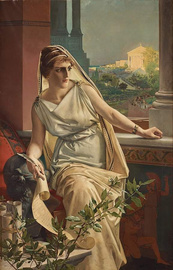The last scientist who worked in the Alexandria Library was a mathematician, astronomer, physicist and the head of the Neoplatonic school of philosophy - an extraordinary range of accomplishments for any individual in any age. Her name was Hypatia. She was born in Alexandria in 370. At a time when women had few options and were treated as property, Hypatia moved freely and unselfconsciously through traditional male domains. By all accounts she was a great beauty. She had many suitors but rejected all offers of marriage. The Alexandria of Hypatia’s time - by then long under Roman rule - was a city under grave strain. Slavery had sapped classical civilization of its vitality. The growing Christian Church was consolidating its power and attempting to eradicate pagan influence and culture. Hypatia stood at the epicenter of these mighty social forces. Cyril, the Archbishop of Alexandria, despised her because of her close friendship with the Roman governor, and because she was a symbol of learning and science, which were largely identified by the early Church with paganism. In great personal danger, she continued to teach and publish, until, in the year 415, on her way to work she was set upon by a fanatical mob of Cyril’s parishioners. They dragged her from her chariot, tore off her clothes, and, armed with abalone shells, flayed her flesh from her bones. Her remains were burned, her works obliterated, her name forgotten. Cyril was made a saint.
-Carl Sagan, Cosmos



Enjoy being online again!
Welcome to the community of good people who base their values on evidence and appreciate civil discourse - the social network you will enjoy.Create your free account
9 comments
Feel free to reply to any comment by clicking the "Reply" button.Love the story of her life. Absolutely loathe small minds, insecure incels and the masses of stupid people who get whipped up to do horrible acts.
Carl Sagan did it to showcase his evident vast knowledge, but nobody has to take a time warp trip to the fourth century to demonstrate the cruelty, hypocrisy and unreasonable nature of any religion, just open your eyes any day and look around.
So true
I would not say avoid the film "Agora", about her life, for it does capture some of the spirit of the times, but it is a wildly inaccurate depiction the facts of her life and times. Worth a look if you take your sceptical head with you.
I didn't think much of that movie, as David wrote, left out one of the most important, yet "controversial" (?) details...her death.
Catherine Nixey's book "The Darkening Age" is where I learned of Hypathia , Bishop Cyril and the details of her death
Christians have committed some ghastly crimes. The killing of Hypatia is one of many. Way too many.
Enjoy being online again!
Welcome to the community of good people who base their values on evidence and appreciate civil discourse - the social network you will enjoy.Create your free account
Share this post
Categories
Agnostic does not evaluate or guarantee the accuracy of any content. Read full disclaimer.





